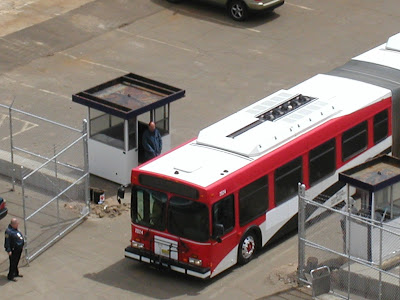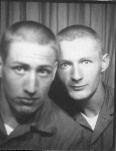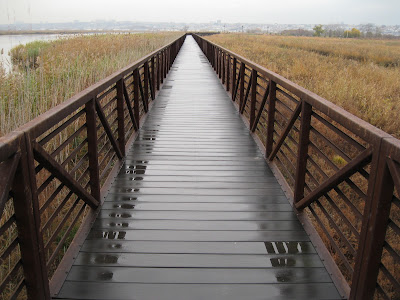Chapter 10: A change of direction
After all that waiting, Pittsburgh rolled around us before I could blink.
Thousands of lights glowed in the twilight, including monstrous glowing shapes Wanda, the hostess informed us were steel mills.
This was capitol of American steel. I shivered. The passing hostess paused, asking if I needed a blanket, although we knew we would be halting soon, her voice nearly as sweet as her perfume.
Mrs. Warton woke from a slight dose. She blinked for a moment as if trying to figure out where she was.
"You'll be leaving us soon," she said. "This is the most difficult part about meeting new friends on the road. After a little while you have to part."
"I don't want to," I mumbled. "If I had my druthers, I'd go all the way to Los Angeles with you."
"Sure, you do," Mrs. Warton said, reaching across the aisle to pat my arm.
The more I thought about it, the more attractive Los Angeles seemed to me, palm trees and warm air, even in Winter.
Mrs. Warton's husband snorted and turned, rolling his shoulders, yet stayed asleep. Behind us, several other men, one across on Mrs. Warton's side, glowed under the effect of the overhead lamp, reading newspapers they had brought onto the bus in Philadelphia, the miles making the information less and less relevant. One man had his glassed titled down on his nose, making him look a little like my grandfather who -- while a live -- had done much the same when he read.
On my side, in the seat closest to the window behind me, a tall, bearded man sat with his eyes closed and a cigarette dangling dangerously from his lips, the ash growing closer and closer to that point at which to ignite his beard.
I found myself gripping the arms of my seat as if fear of falling.
That’s when the stench hit me. This was not a wave of bad air we would pass through and then breathe freely again. This was something that grew more powerful as we grew closer to the city's center.
"My God!" Mrs. Warton moaned. "What on earth is that smell?"
"It's the mills," the man with the beard behind me said. He had a serious voice that almost make me think he was a cop. "This town makes steel. That's the smell of steel being made. Of coal being burnt. Of metal melting. You get used to it after a while, and in fact, when you go away from it, you miss it."
"I could never get used to that!" Mrs. Warton said, glancing out towards the lights, although none glowed from the side of the mills, suggesting we still had some distance to go before we came face to face with them, or discovered just how strong the stench could get.
"But you do get used to it," the man insisted. "I know. I grew up here and learned to love that smell."
"Love?"
"It is the smell of home to me,” he said. “I tell myself how much I hate it here when I’m here. But something keeps dragging me back.”
The man fell silent as he stared through the window at the glowing city.
“My father used to work in the mills,” he went on. “He used to come back after his shifts so tired, he didn’t even bother saying goodnight, or even hello. He just crawled up the steps to his bed and fell in. My mother used to watch him. She had a look of pity. She got to looking old even when she wasn’t. Sometimes late at night, I heard her crying when she thought everybody else was asleep. I still hear her crying, her ghost calling my father’s name”
He looked back at us, chucked, then lit another cigarette from the butt of the old, sank back into his seat to close his eyes again.
The bus bumped over rougher and rougher roads, telling me that we had finally left the highway and onto the city's streets. I clutched my bag. Mrs. Warton sneezed, took out some tissues from her purse. Her husband coughed and woke.
"What the hell...?" he sputtered.
"We're in Pittsburgh, dear," Mrs. Warton said, blowing her nose. "Isn't it awful?"
Suddenly, the station was round us, filled with other buses, each of them going some place different with only a handful of waiting passengers around each, standing with bags at their knees.
I sat back in my seat, feeling my heartbeat slowing, unaware of just how fast it had leading up to our arrival.
When the bus stopped after a long time of tires popping over gravel, I didn't move.
While the rest of the bus seemed in a sudden rush to get out, a huge hand seemed to press on my chest, shoving me deeper into the seat.
Outside, bright flood lights illuminated the yard where figures in coveralls moved towards the bus.
"Two-hour rest stop," the driver announced.
"Two hours?" Mrs. Warton said as the hostess made her way up the aisle. "Why so long?"
"It gives the team a chance to clean the bus," the hostess said.
I eased up, dragging my bag behind me.
"Oh, you don't have to take your things," the hostess said. "The team won't touch anything."
"I have to change buses," I said, making my way to the front, then down the steps into the yard where I confronted Winter for the first time, a biting, bone-chilling Winter I was under dressed to greet.
Pittsburgh's foul air made it difficult for me to breathe, not only from the mills the bearded man seemed to miss so much, but from the line of running buses, whose fumes seemed to hover over the yard in a perpetual cloud.
I stood at the edge of the platform, watching the other passengers streaming out of the bus and hurriedly making their way across the yard to the doors of the station, some huddling just outside to take in a cigarette before entering. Some there glanced up at the sky in apparent expectations of snow, what was to be the first of the season here.
My breath steamed before me in the yellow lights.
Nearby, a bus bound for New York City pulled out, tires kicking up gravel in the yard. I watched it until its taillights vanished, then crossed the yard and joined the other passengers nearer the station door. Men dressed in olive green jump suits boarded our bus, carrying an assortment of vacuums and other cleaning products.
I found Mrs. Warton's Bill standing on the platform shaking his head slowly.
"How can it take two hours to clean a bus?" he muttered.
"They must do a good job," I said. "The bus was clean when I got on. Let's go inside. It's too cold out."
I was still thinking about Chicago.
The interior of the station had a locker, ticket counters, newspaper stands and a coffee shop. I steered towards the coffee counter and watched the waitress in a green dress fill a container with steaming liquid.
Here as in Philadelphia, a group of old men and women played musical chairs as the police stirred them up at intervals to keep them from sleep.
I caught sight of the silver-haired man from the bus exiting the men’s room and watched him leave, assuming he had a home to go to.
Bill Warton settled at the counter next to me but ordered tea instead of coffee.
"I think I'm going to go on to Los Angeles," I told him.
He looked surprised. His white beard and moustache flicked.
"Just like that, you make up your mind?" he asked.
"Actually, I've been thinking about it since we left Philadelphia," I said, telling only a partial truth. “I’m worried about the northern route and getting stuck in the snow.”
“What about Denver?”
“I checked. I can get there from L.A.,” I said.
“If you’re going to do that, you’d better change your ticket,” Bill advised.
I hurried over to the ticket counter where a man with a old fashioned cut away hat greeted me, his hair sticking out the top like a plume of white feathers.
"I'd like to cash in this ticket on a ticket to Los Angeles," I told him, easing the wrinkled ticket across the counter. He pushed it back at me with the tips of his ink-stained fingers.
"Main office," he said.
"I don't understand."
"We're not authorized to cash in tickets. You have to do that at the main office, in Omaha."
"Nebraska?"
"Yep."
"How the hell do I do that?"
"The address is on the back."
"You mean I can't get a ticket to Los Angeles."
"Sure, you can get a ticket to L.A., you just can't use that to pay for it."
“All right," I said. "Give me a ticket to Los Angeles. I'll pay cash."
The man handed me a green ticket stub. I stuffed both old and new into the inside pocket of my jacket, then took a seat on one of the benches to wait for the bus to be ready. I glanced over at the gift shop and saw a rack with books on it, and I decided I needed a book to pass the time not just now, but on the long ride ahead.
Inside the shop, I found the Wartons.
“Did you change your ticket?” Bill Warton asked.
“What’s this about a ticket?” the distracted Mrs. Warton asked, standing in front of shelf full of Pittsburgh souvenirs.
“The boy’s decided to go all the way to L.A with us,” Bill informed her.
“That’s marvelous,” Mrs. Warton said. “But what about your luggage? Won’t they be putting in on the bus for Chicago?”
“I’m carrying all I have,” I said, indicating the small suitcase and the brief case I had brought off the bus with me.
“Maybe we should check on our bus,” said Bill. “I’m sure it’ll be ready by now.”
We went outside, me having bought a book, the Warton’s, two ash trays and some picture post cards.
A bus was pulling out of a slot, and we hurried towards it.
The bus wasn’t ours; it was bound for Chicago.
,




Comments
Post a Comment